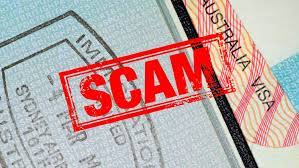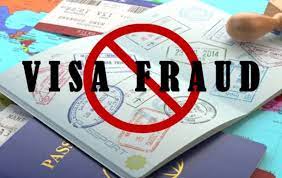Traveling abroad can be an exciting and enriching experience, but it often requires obtaining a visa. Unfortunately, visa fraud and scams are becoming more common, with scammers taking advantage of people’s desire to travel to other countries. These scams can be costly, time-consuming, and even dangerous. In this article, we will explore some common visa fraud and scams and provide tips on how to avoid them.
What is Visa Fraud?
Visa fraud occurs when a person or group intentionally misrepresents information on a visa application, or provides false or fraudulent documents to obtain a visa. This can include misrepresenting the purpose of travel, lying about employment or financial information, or providing fake documents such as bank statements or letters of invitation. Visa fraud can result in a visa being denied, revoked or cancelled, or even lead to criminal charges.
Common Visa Scams
Visa scams are designed to trick people into paying money for a visa, or to steal personal or financial information. These scams can take many forms, but some of the most common include:
Online Scams – Scammers create fake websites that look like official government sites, and ask for personal and financial information, or offer to sell visas for a fee.

Email Scams – Scammers send emails claiming to be from government agencies or visa processing companies, asking for payment or personal information.
Phone Scams – Scammers call people claiming to be from government agencies or visa processing companies, asking for payment or personal information.
Fake Job Scams – Scammers advertise fake job opportunities abroad, and ask for money or personal information to “process” the visa.
Lottery Scams – Scammers claim that a person has won a visa lottery, and ask for payment or personal information to “process” the visa.
How to Avoid Visa Fraud and Scams
Research the Visa Process – Before applying for a visa, research the process and requirements for the country you are visiting. Official government websites or reputable travel agencies are good sources of information.
Use Official Websites – Only use official government websites or reputable travel agencies to apply for a visa. Check the website address to ensure that it is legitimate.
Don’t Share Personal Information – Never share personal or financial information with strangers online, through email, or over the phone.
Be Wary of Unsolicited Emails or Phone Calls – If you receive an unsolicited email or phone call claiming to be from a government agency or visa processing company, be wary. Do not provide any personal or financial information unless you are sure that the person or organization is legitimate.
Don’t Pay for a Visa – Legitimate government agencies do not charge for visa applications or processing. If you are asked to pay for a visa, it is likely a scam.

Verify Employment Opportunities – If you are offered a job abroad, verify the company and job offer before providing any personal or financial information.
Use a Reputable Travel Agency – If you are unsure about the visa process, or if you want to avoid potential scams, consider using a reputable travel agency to help you with your visa application.
Be Cautious of Lottery Scams – Visa lotteries do exist, but they are rare and highly competitive. Be wary of any unsolicited emails or phone calls claiming that you have won a visa lottery.
Trust Your Instincts – If something seems too good to be true, it probably is. Trust your instincts and be cautious of any offers that seem suspicious or too easy.
Visa fraud and scams are becoming more common, and it is important to be aware of the risks and take steps to protect yourself. By researching the visa process, using official websites, and being cautious of unsolicited emails or phone calls, you can help to avoid potential scams. If you are unsure about the visa process or have any concerns, consider using a reputable travel agency or consulting with a visa specialist. By taking these steps, you can help to ensure that your travels are safe, enjoyable, and memorable.
It is also important to note that visa fraud and scams can have serious consequences, both financially and legally. In addition to losing money or having a visa application denied, victims of visa fraud may also face criminal charges or be barred from entering a country in the future. By being cautious and taking steps to avoid scams, you can help to protect yourself and your future travels.
If you believe that you have been a victim of visa fraud or a visa scam, it is important to report it to the appropriate authorities. This can include the embassy or consulate of the country you are visiting, your local law enforcement agency, or the Federal Trade Commission (FTC) in the United States. Reporting scams can help to prevent others from falling victim to the same scam, and may also help to track down and prosecute the scammers.
In conclusion
Visa fraud and scams are a growing concern for travelers, but there are steps that you can take to avoid them. By researching the visa process, using official websites, and being cautious of unsolicited emails or phone calls, you can help to protect yourself from potential scams. If you do fall victim to a scam, it is important to report it to the appropriate authorities to help prevent others from being scammed. By being vigilant and taking steps to protect yourself, you can help to ensure that your travels are safe and enjoyable.
In addition, it is important for governments to take steps to combat visa fraud and scams. This can include increasing awareness of the risks, implementing stronger regulations and penalties for fraudsters, and providing resources and support for victims of fraud. By working together, individuals, businesses, and governments can help to reduce the incidence of visa fraud and scams and protect travelers from harm.
Visa fraud and scams are a growing concern for travelers, but there are steps that can be taken to avoid them. It is important to be aware of the risks and to take steps to protect yourself, such as researching the visa process, using official websites, and being cautious of unsolicited emails or phone calls. Employers should also be cautious of potential fraudsters and should verify the legitimacy of any job offers or visa applications. By working together, individuals, businesses, and governments can help to reduce the incidence of visa fraud and scams and ensure that travelers are able to enjoy their travels safely and securely.











